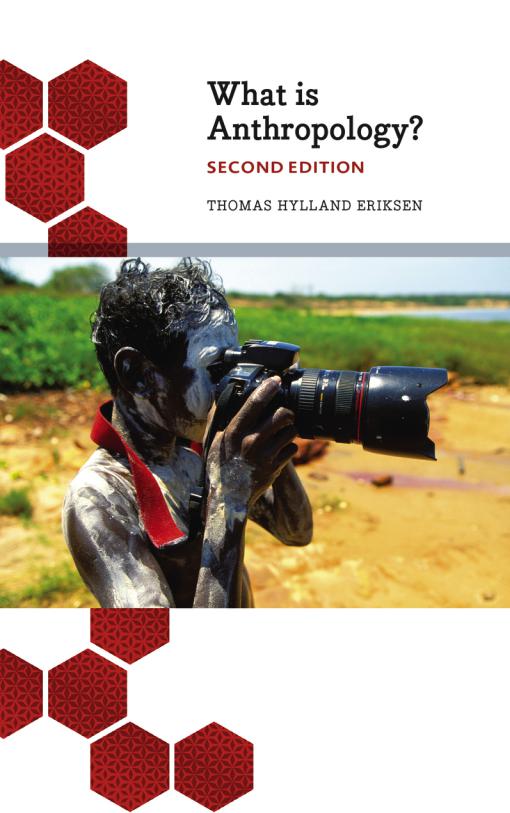

What is Anthropology?
Anthropology, Culture and Society
Series Editors:
Doctor Jamie Cross, University of Edinburgh
and
Professor Christina Garsten, Stockholm University
Recent titles:
The Limits to Citizen Power: Participatory Democracy and the Entanglements of the State
Victor Albert
Becoming Arab in London:
Performativity and the Undoing
of Identity
Ramy M. K. Aly
Community, Cosmopolitanism
and the Problem of Human
Commonality
Vered Amit and Nigel Rapport
Anthropologies of Value
Edited by Luis Fernando
Angosto-Ferrandez and
Geir Henning Presterudstuen
Dream Zones:
Anticipating Capitalism and
Development in India
Jamie Cross
A History of Anthropology
Second Edition
Thomas Hylland Eriksen
and Finn Sivert Nielsen
Ethnicity and Nationalism:
Anthropological Perspectives
Third Edition
Thomas Hylland Eriksen
Fredrik Barth:
An Intellectual Biography
Thomas Hylland Eriksen
Small Places, Large Issues: An Introduction to Social and Cultural Anthropology Fourth Edition
Thomas Hylland Eriksen
At the Heart of the State:
The Moral World of Institutions
Didier Fassin, et al.
Anthropology and Development:
Challenges for the
Twenty-first Century
Katy Gardner
and David Lewis
Organisational Anthropology:
Doing Ethnography In and
Among Complex Organisations
Edited by Christina Garsten
and Anette Nyqvist
Children of the Welfare State:
Civilising Practices in Schools,
Childcare and Families
Laura Gilliam
and Eva Gulløv
Anthropology’s World:
Life in a Twenty-First Century
Discipline
Ulf Hannerz
Humans and Other Animals: Cross-cultural Perspectives on Human–Animal Interactions
Samantha Hurn
Flip-Flop:
A Journey Through
Globalisation's Backroads
Caroline Knowles
Faith and Charity:
Religion and Humanitarian Assistance in West Africa
Edited by Marie Nathalie
LeBlanc and Louis Audet
Gosselin
The Anthropology of Security: Perspectives from the Frontline of Policing, Counter-Terrorism and Border Control
Edited by Mark Maguire, Catarina Frois
and Nils Zurawski
The Gloss of Harmony:
The Politics of Policy Making
in Multilateral Organisations
Edited by Birgit Müller
Contesting Publics
Feminism, Activism,
Ethnography
Lynne Phillips and Sally Cole
Food For Change
The Politics and Values of Social
Movements
Jeff Pratt
and Peter Luetchford
Base Encounters:
The US Armed Forces
in South Korea
Elisabeth Schober
Checkpoint, Temple, Church
and Mosque:
A Collaborative Ethnography
of War and Peace
Jonathan Spencer, Jonathan
Goodhand, Shahul Hasbullah,
Bart Klem, Benedikt Korf
and Kalinga Tudor Silva
Race and Ethnicity in
Latin America
Second Edition
Peter Wade
The Making of an African
Working Class:
Politics, Law and Cultural
Protest in the Manual Workers’
Union of Botswana
Pnina Werbner

What is Anthropology?
Second Edition
Thomas Hylland Eriksen
First published 2004; second edition 2017 by Pluto Press 345 Archway Road, London N6 5AA
www.plutobooks.com
Copyright © Thomas Hylland Eriksen 2004, 2017
The right of Thomas Hylland Eriksen to be identified as the author of this work has been asserted by him in accordance with the Copyright, Designs and Patents Act 1988.
British Library Cataloguing in Publication Data
A catalogue record for this book is available from the British Library
ISBN |
978 0 7453 9966 9 |
Hardback |
ISBN |
978 0 7453 9965 2 |
Paperback |
ISBN |
978 1 7868 0090 9 |
PDF eBook |
ISBN |
978 1 7868 0092 3 |
Kindle eBook |
ISBN |
978 1 7868 0091 6 |
EPUB eBook |
This book is printed on paper suitable for recycling and made from fully managed and sustained forest sources. Logging, pulping and manufacturing processes are expected to conform to the environmental standards of the country of origin.
Typeset by Stanford DTP Services, Northampton, England
Simultaneously printed in the United Kingdom and United States of America
Make everything as simple as possible. But no simpler. (Einstein)
He who speaks no foreign language knows nothing about his own. (Goethe)
Contents
Series Preface |
viii |
|
PART 1 ENTRANCES |
|
|
1 |
Why Anthropology? |
3 |
2 |
Key Concepts |
19 |
3 |
Ethnography |
41 |
4 |
Theories |
60 |
PART 2 FIELDS |
|
|
5 |
Reciprocity |
83 |
6 |
Kinship |
98 |
7 |
Nature |
117 |
8 |
Thought |
136 |
9 |
Social Identity |
152 |
Bibliography |
167 |
|
Index |
171 |
|
Series Preface
Anthropology is a discipline based upon in-depth ethnographic works that deal with wider theoretical issues in the context of particular, local conditions – to paraphrase an important volume from the series: large issues explored in small places. This series has a particular mission: to publish work that moves away from an old-style descriptive ethnography that is strongly area-studies oriented, and offer genuine theoretical arguments that are of interest to a much wider readership, but which are nevertheless located and grounded in solid ethnographic research. If anthropology is to argue itself a place in the contemporary intellectual world, then it must surely be through such research.
We start from the question: ‘What can this ethnographic material tell us about the bigger theoretical issues that concern the social sciences?’ rather than ‘What can these theoretical ideas tell us about the ethnographic context?’ Put this way round, such work becomes about large issues, set in a (relatively) small place, rather than detailed description of a small place for its own sake. As Clifford Geertz once said, ‘Anthropologists don’t study villages; they study in villages.’
By place, we mean not only geographical locale, but also other types of ‘place’ – within political, economic, religious or other social systems. We therefore publish work based on ethnography within political and religious movements, occupational or class groups, among youth, development agencies, and nationalist movements; but also work that is more thematically based – on kinship, landscape, the state, violence, corruption, the self. The series publishes four kinds of volume: ethnographic monographs; comparative texts; edited collections; and shorter, polemical essays.
We publish work from all traditions of anthropology, and all parts of the world, which combines theoretical debate with empirical evidence to demonstrate anthropology’s unique position in contemporary scholarship and the contemporary world.
Dr Jamie Cross
Professor Christina Garsten
Part 1
Entrances
